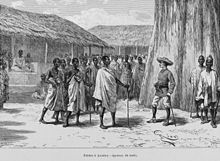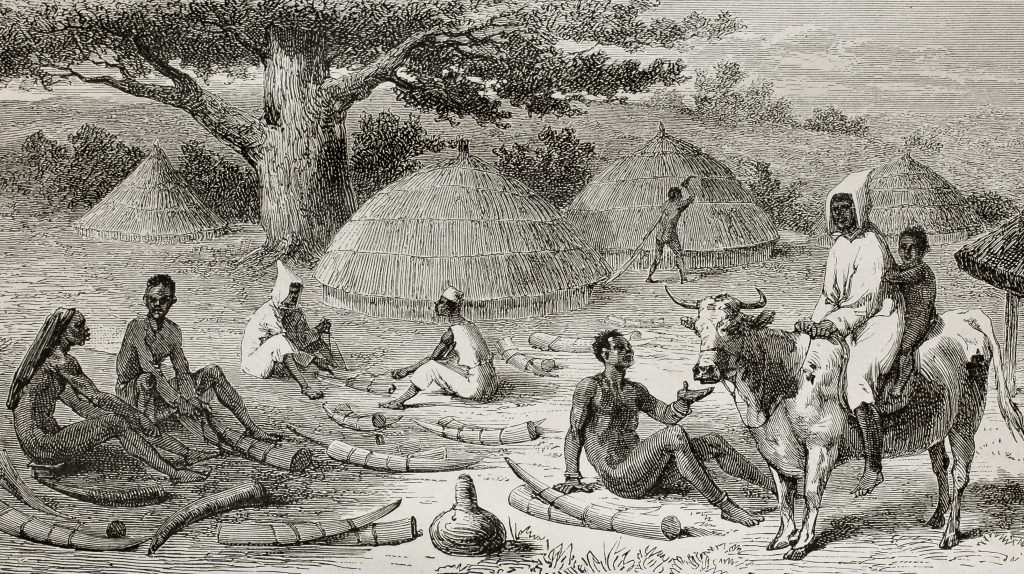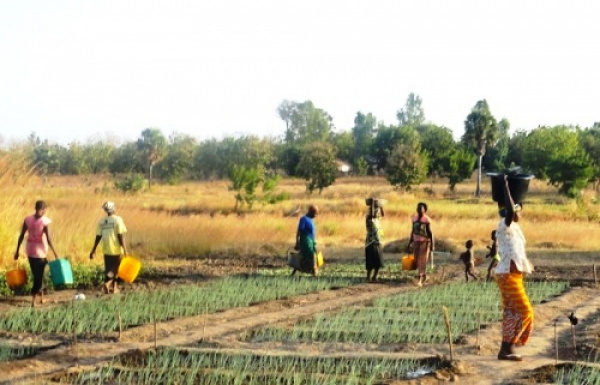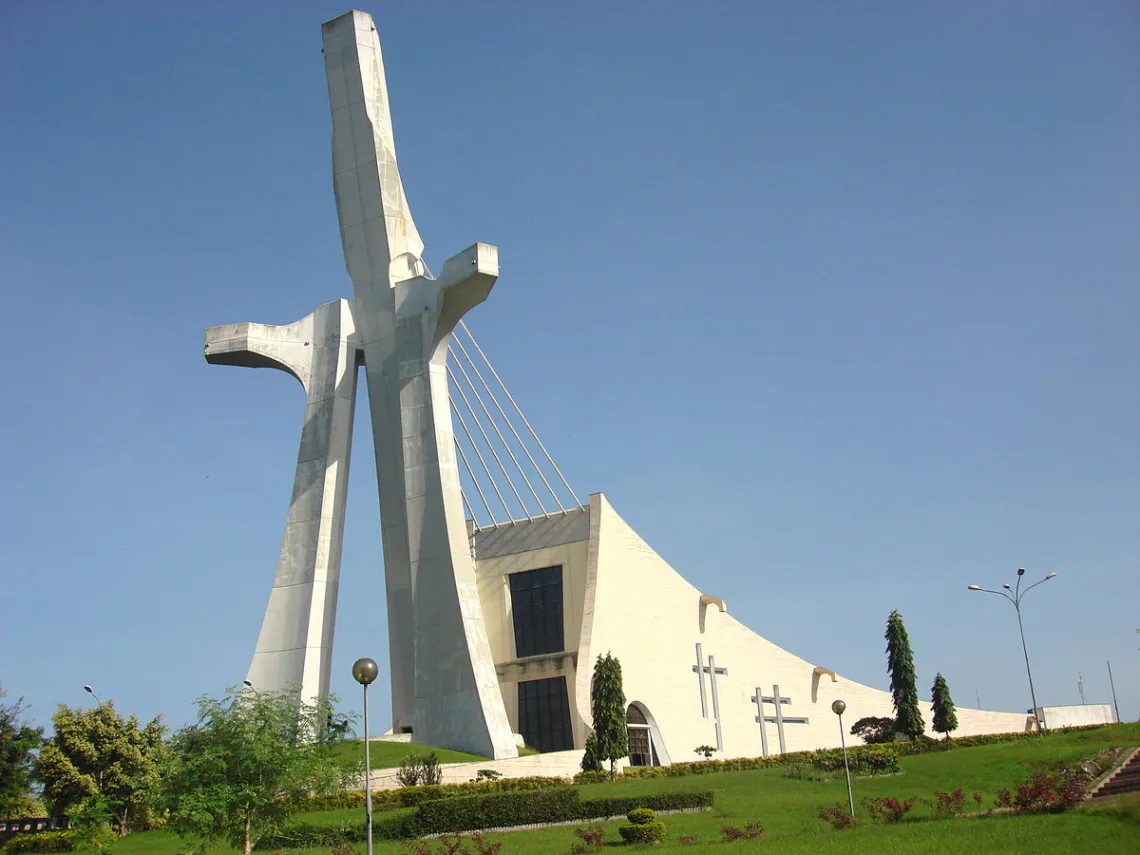Brief History of Côte d'Ivoire
Côte d’Ivoire has a rich pre-colonial history. Five major native states flourished in the pre-European era:
1. the Muslim Kong Empire;
2. the Abron kingdom of Gyaaman;
3. the Baoule kingdom at Sakasso; and two Agni kingdoms: Indénie and Sawwi.
The Portuguese explored the coast in 1482 but did not establish a colony. Because of its strong native kingdoms, Côte d’Ivoire did not figure much in the slave trade.

A small French settlement was established in 1637. It was not until 1843, however, that France, began to move beyond this settlement to enter into treaties with local West African rulers, which enabled them to build fortified posts along the coast that could become permanent trading centers.
In the mid-1880s France began to explore and expand its influence into the interior. In 1887, French officers secured nine treaties with native tribes that extended French influence inland. In 1893, Côte d’Ivoire has formally declared a French colony.
The declared pillars of French colonial policy aimed at assimilation and association. As a result, Côte d’Ivoire attracted more settlers than any other West African colony, whether French or not. The settlers’ main goal was to increase exports by expanding the planting of coffee, cocoa, and palms for palm oil.

After World War II, the policy of assimilation was strengthened to grant French citizenship to all former African subjects, and the right to organize themselves politically was recognized. For the first decade or so after the war, most Ivorian leaders believed that the best route was to assimilate with France, largely because being a French possession carried with it immense economic advantages.
By the mid-1950s, however, most Ivorians concluded that equality could only be achieved by independence.
Felix Houphouët Boigny—the "Father of Côte d’Ivoire’s Independence", "Grand Old Man", and "Sage of Africa"
The modern history of Ivorian independence begins with the dynamic personality and leadership of Felix Houphouët Boigny (pronounced Feliks Oufwet Bwajni) (1905-1993) who was a major leader in Ivorian politics from the 1940s. He led the country to independence and served as its first president from 1960 to his death in 1993.
The modern history of Ivorian independence begins with the dynamic personality and leadership of Felix Houphouët Boigny (pronounced Feliks Oufwet Bwajni) (1905-1993)
His original name was simply Houphouët. He took his first name, Felix, upon converting to the Catholic Church in 1915, and added the name Boginy—which means irresistible power—when he won his first run-off election in 1945. The name by which he is universally known, however, is his original or middle name, Houphouët.
Houphouët was born in 1905 to an important Boule family and inherited a large farm. In 1940 he was selected as the chief of his district, and in 1944 became prominent by helping to organize the Syndicat Agricole Africain (SAA) or African Agricultural Association, the first large organization to protect the rights of Black farmers in Africa.
Within a year the SAA spread throughout the country and served as the basis for forming the Democratic Party of Côte d’Ivoire (PDCI according to its French name). After the war, France granted rights to its colonial natives, and in 1946, Houphouët was elected to the French National Assembly. In Paris, Houphouët rose to the attention of several successive French leaders, including President Charles De Gaulle. Advancing rapidly in politics, he became the first African to serve as a minister in a European government.

As independence movements spread across Africa, Houphouët led Côte d’Ivoire to independence but, contrary to many other independence movements, advocated maintaining close economic, political, and social ties with France. When independence was achieved in August 1961, Houphouët was elected its first president and was reelected for the next three decades.
Houphouët’s policy of working closely with France worked out handsomely for Côte d’Ivoire. For the next two decades after independence, Côte d’Ivoire underwent an economic boom.
Ivorians soon had the highest average income in any non-oil-producing African state, with the economy growing by more than ten percent per year. Houphouet was credited with presiding over the “Ivorian Miracle.”
At its height in the early 1960s, Cote d'Ivoire was said to be a model that looked to be emulated even by Singapore.
His policy of working with France also paid off well for the French. Between 1961 and 1980, the number of French in Côte d’Ivoire doubled, from 30,000 to over 60,000.
Houphouët’s strategy from the beginning was to build on Côte d’Ivoire’s strongest asset, its agricultural sector, by developing the market for unprocessed agricultural products, namely, coffee, cocoa, palm oil, pineapples, bananas, rubber, cashew nuts, and lumber. However, beginning in the mid-1980s, commodity prices declined, resulting at the end of boom times in Côte d’Ivoire.
|
Although Houphouët was democratically elected and reelected, was nearest to a king in his single state. He amassed a huge personal fortune estimated to be approximately $10 bill. USD. |
During Houphouët’s presidency, there was little opposition and few political prisoners. Rather than imprison them, Houphouet preferred to offer lucrative jobs to his critics and opponents. As the approached the end of his life, however, he recognized the need to revive the political process and encouraged the formation of political parties, which were well in place for the next presidential election after his death.
Although Houphouët was democratically elected and reelected, was nearest to a king in his single state. He amassed a huge personal fortune estimated to be approximately $10 bill. USD.
He was also able to engage in monumental projects of enormous expense. In 1983 he designated the village of his birth, Yamoussoukro, as the official capital of the nation, and began constructing many buildings and infrastructure at great public expense, such as the Institute Polytechnique and an international airport.

His most luxurious project was the Basilica of Our Lady of Peace, which is currently the largest church in the world, with an area of 30,000 square meters (320,000 sq ft) and a height of 158 meters (518 ft). This was not built at public expense but was personally financed by Houphouët at a total cost of about USD $150–200 million. Houphouët offered it to Pope John Paul II, as a personal gift. It was consecrated as a Basilica by John Paul II in September 1990.
At the time of his death in 1993, Houphouët was the longest-serving leader in Africa, and the third longest-serving leader in the world, surpassed only by Kim Il Sung of Korea and Fidel Castro. He also became the most well-known and revered African leader, affectionately known as Papa Houphouët, the “Sage of Africa,” the “Grand Old Man of Africa,” or simply as Le Vieux, "The Old One."
Crops and natural resources
Côte d'Ivoire also has a large timber industry due to its large forest coverage. The nation's hardwood exports match that of Brazil. In recent years there has been much concern about the rapid rate of deforestation. Rainforests are being destroyed at a rate sometimes cited as the highest in the world. The only forest left completely untouched in Côte d'Ivoire is Taï National Park (Parc National de Taï), a 3600km² (1400 square mile) area in the country's far southwest that is home to over 150 endemic species and many other endangered species such as the Pygmy Hippopotamus and 11 species of monkeys.
Eight percent of the country is arable land. Côte d'Ivoire is the world's largest producer of cocoa, a major national cash crop. Other chief crops include coffee, bananas, and oil palms, which produce palm oil and kernels. Natural resources include petroleum, natural gas, diamonds, manganese, iron, cobalt, bauxite, copper, and hydropower.
History
Little is known about Côte d'Ivoire before the arrival of Portuguese ships in the 1460s. The major ethnic groups came relatively recently from neighboring areas: The Kru people came from Liberia around 1600; the Senoufo and Lobi moved southward from Burkina Faso and Mali; in the eighteenth and nineteenth centuries, the Akan people, including the Baoulé, migrated from Ghana into the eastern area of the country, and the Malinké from Guinea into the northwest.
French colonial era
Compared to neighboring Ghana, Côte d'Ivoire suffered little from the slave trade. European slaving and merchant ships preferred other areas along the coast with better harbors. France took an interest in the 1840s, enticing local chiefs to grant French commercial traders a monopoly along the coast. Thereafter, the French built naval bases to keep out non-French traders and began a systematic conquest of the interior. They accomplished this only after a long war in the 1890s, against Mandinka forces, mostly from Gambia. Guerrilla warfare by the Baoulé and other eastern groups continued until 1917.
France's main goal was to stimulate the production of exports. Coffee, cocoa, and palm oil crops were soon planted along the coast. Côte d'Ivoire stood out as the only West African country with a sizable population of "settlers;" elsewhere in West and Central Africa, the French and British presence were largely as bureaucrats. As a result, a third of the cocoa, coffee, and banana plantations were in the hands of French citizens and a deleterious forced labor system became the backbone of the economy.
Independence
The son of a Baoulé chief, Félix Houphouët-Boigny, was to become Côte d'Ivoire's father of independence. In 1944, he formed the country's first agricultural trade union for African cocoa farmers like himself. Annoyed that colonial policy favored French plantation owners, they united to recruit migrant workers for their farms. Houphouët-Boigny soon rose to prominence and within a year was elected to the French Parliament in Paris. A year later the French abolished forced labor. As Houphouët-Boigny grew fonder of money and power and became more ingratiated with the French, he gradually dropped the more radical stance of his youth. France reciprocated by making him the first African to become a minister in a European government.
At the time of Côte d'Ivoire's independence in 1960, the country was easily French West Africa's most prosperous, contributing over 40 percent of the region's total exports. When Houphouët-Boigny became the first president, his government gave farmers good prices to further stimulate production. Coffee production increased significantly, catapulting Côte d'Ivoire into third place in total output behind Brazil and Colombia. By 1979, the country was the world's leading producer of cocoa. It also became Africa's leading exporter of pineapples and palm oil. French technicians contributed to the "Ivorian miracle." In the rest of Africa, Europeans were driven out following independence; but in Côte d'Ivoire, they poured in. The French community grew from 10,000 to 50,000 inhabitants, most of them teachers, and advisers. For twenty years, the economy maintained an annual growth rate of nearly 10 percent—the highest of Africa's non-oil-exporting countries.
Houphouët-Boigny administration
Politically, Houphouët-Boigny ruled with an iron hand. The press was not free, and only one political party was tolerated. Houphouët-Boigny was also Africa's number one producer of "show" projects. So many millions of dollars were spent transforming his village, Yamoussoukro, into the new capital that it became the butt of jokes. But by the early 1980s, the world recession and a local drought sent shock waves through the Ivorian economy. Due in large part to the overcutting of timber and collapsing sugar prices, the country's national debt increased threefold. Crime rose dramatically in Abidjan. The miracle was over.
In 1990, hundreds of civil servants went on strike, joined by students protesting institutional corruption. The unrest forced the government to support multi-party democracy. Houphouët-Boigny became increasingly feeble and died in 1993. He favored Henri Konan Bédié as his successor.
Bédié administration
In October 1995, Bédié won re-election, overwhelming a fragmented and disorganized opposition. He tightened his hold over political life, jailing several hundred opposition supporters. In contrast, the economic outlook improved, at least superficially, with decreasing inflation and an attempt to remove foreign debt.
Bedié was very careful at avoiding ethnic conflict and left access to Ivorian nationality wide-open to immigrants from neighboring countries. Unlike Houphouët-Boigny, Bedié emphasized the concept of "Ivority" (Ivoirité) to exclude his rival Alassane Ouattara. Under his direction, having only one parent of Ivory Coast nationality was sufficient proof of citizenship to be elected president of Cote d'Ivoire. As people originating from Burkina Faso are a large part of the Ivorian population, this policy excluded many people from Ivorian nationality, and the relationship between various ethnic groups became strained.
1999 coup
Similarly, Bédié excluded many potential opponents from the army. In late 1999, a group of dissatisfied officers staged a military coup, putting General Robert Guéi in power. Bédié fled to exile in France. The coup successfully reduced crime and corruption, and its leaders, the army general corps, pressed for austerity and openly campaigned in the streets for a less wasteful society.
Gbagbo administration
A presidential election was held in October 2000, but it was neither peaceful nor democratic. The lead-up to the election was marked by military and civil unrest. Alassane Ouattara was disqualified by the country's Supreme Court, due to his Burkinabé nationality. This sparked violent protests in which Ouattara's supporters, predominantly from the country's Muslim north, battled riot police in the capital, Yamoussoukro. Guéï claimed victory in the election, but Gbagbo supporters took to the streets, toppling Guéï who fled the capital. Gbagbo installed himself as President on October 26, 2000.
First Ivorian Civil War
In the early hours of September 19, 2002, troops, who were to be demobilized, mutinied. They launched attacks in several cities. By noon, the Government claimed to have beaten the rebels; when in fact they had lost control of the north of the country, which remains divided from the south. The fight for control of the South had been tough also. The battle for the main Gendarmerie Barracks in Abidjan lasted till mid-morning. What exactly happened that night is disputed. The Gbagbo government said that former president Robert Guéi had led a coup attempt, and state television showed pictures of Guéi's dead body in the street. Counter-claims said that he and fifteen others had been murdered at his home and his body had been dragged into the streets to incriminate him. Alassane Ouattara, his home burned down, took refuge in the French embassy.
President Gbagbo cut short a foreign trip to Italy, and on his return, said some of the rebels were hiding in the shanty towns where foreign migrant workers live. Gendarmes and vigilantes attacked the migrant workers, bulldozing and burning thousands of their homes.
An early ceasefire with the rebels, who had the backing of the northern populace (mostly of Burkinabé origin), proved short-lived, and fighting over the prime cocoa-growing areas resumed. France sent in troops to maintain the cease-fire boundaries, and militias, including warlords and fighters from Liberia and Sierra Leone, took advantage of the crisis to seize parts of the West.
2003 unity government
In January 2003, President Gbagbo and rebel leaders signed accords creating a "government of national unity." Curfews were lifted and French troops cleaned up the lawless western border of the country. But the central problems remained, and neither side achieved its goals.
After that President Gbagbo's Unity government has proven unstable. In March 2004, 120 people were killed in an opposition rally. A later report concluded the killings were government-planned. Though United Nations peacekeepers were deployed, relations between Gbagbo and the opposition continued to deteriorate.
"Child soldier in the Ivory Coast."
Early in November 2004, after the peace agreement had effectively collapsed following the rebels' refusal to disarm, Gbagbo ordered airstrikes against the rebels. During one of these airstrikes in Bouaké, French soldiers were hit and nine of them were killed; the Ivorian government has said it was a mistake, but the French have claimed it was deliberate. They responded by destroying most Ivoirian military aircraft (2 Su-25 planes and 5 helicopters), and violent retaliatory riots against the French broke out in Abidjan.
Gbagbo's original mandate as president expired on October 30, 2005, but due to the lack of disarmament it was deemed impossible to hold an election, and therefore his term in office was extended for a maximum of one year, according to a plan worked out by the African Union; this plan was endorsed by the United Nations Security Council.[6] With the late October deadline approaching in 2006, it was regarded as very unlikely that the election would be held by that point, and the opposition and the rebels rejected the possibility of another term extension for Gbagbo. The UN Security Council endorsed another one-year extension of Gbagbo's term on November 1, 2006; however, the resolution provided for the strengthening of Prime Minister Charles Konan Banny's powers. Gbagbo said the next day that elements of the resolution deemed to be constitutional violations would not be applied.
A peace deal between the government and the rebels, or New Forces, was signed on March 4, 2007, and subsequently, Guillaume Soro, leader of the New Forces, became prime minister.
Second Ivorian Civil War
The presidential elections that should have been organized in 2005 were postponed until November 2010. The preliminary results announced by the Electoral Commission showed a loss for Gbagbo in favor of his rival, former prime minister Alassane Ouattara. The ruling FPI contested the results before the Constitutional Council, charging massive fraud in the northern departments controlled by the rebels of the Forces Nouvelles de Côte d'Ivoire (FNCI). These charges were contradicted by international observers. The report of the results led to severe tension and violent incidents. The Constitutional Council declared the results of seven northern departments unlawful and that Gbagbo had won the elections with 51 percent of the vote (instead of Ouattara winning with 54 percent, as reported by the Electoral Commission).
After the inauguration of Gbagbo, Ouattara recognized as the winner by most countries and the United Nations, organized an alternative inauguration. These events raised fears of a resurgence of civil war and thousands of refugees fled the country.
After months of unsuccessful negotiations and sporadic violence, the crisis entered a critical stage as Ouattara's forces seized control of most of the country, with Gbagbo entrenched in Abidjan, the country's largest city. International organizations reported numerous instances of human rights violations by both sides. In the city of Duékoué, hundreds of people were estimated to have been killed, predominantly by advancing pro-Ouattara militias. In nearby Blolequin, dozens of people were killed, reportedly by retreating Liberian militias who had been hired by pro-Gbagbo forces. UN and French forces took military action against Gbagbo and Gbagbo was taken into custody after a raid on his residence on April 11, 2011.
The country was severely damaged by the war, and it was observed that Ouattara had inherited a formidable challenge to rebuild the economy and reunite Ivorians.[9] Gbagbo was taken to the International Criminal Court in The Hague in January 2016. He was declared acquitted by the court but given a conditional release in January 2019. Belgium was designated as the host country.
Politics
The official capital became Yamoussoukro in 1983. However, Abidjan remains the administrative center. Most countries maintain their embassies in Abidjan, although some (including the United Kingdom) have closed their missions because of the continuing violence and attacks on Europeans. The population continues to suffer because of the ongoing civil war. International human rights organizations have noted ongoing problems with the treatment of captive non-combatants by both sides and the re-emergence of child slavery among workers in cocoa production.
Stemming from the incidents which occurred on September 19, 2002, a civil war broke out, and the northern part of the country was seized by the rebels, the New Forces (FN). Although most of the fighting ended by late 2004, the country remained split in two, with the north controlled by the New Forces
Administrative Divisions
Since 2011, Ivory Coast has been administratively organized into 12 districts plus two district-level autonomous cities. The districts are divided into 31 regions; the regions are divided into 108 departments; and the departments are divided into 510 sub-prefectures. In some instances, multiple villages are organized into communes. The autonomous districts are not divided into regions, but they do contain departments, sub-prefectures, and communes.
Women with fruit in Bassam, Ivory Coast
Maintaining close ties to France since independence in 1960, diversification of agriculture for export and encouragement of foreign investment has made Côte d'Ivoire one of the most prosperous of the tropical African states. Although in recent years Côte d'Ivoire has been subject to the global marketplace for its coffee and cocoa, as the main export crops, along with tropical wood, timber, and tuna. Internal corruption makes life difficult for the farmers and growers and for those exporting to foreign markets.
Demographics
The population is considered to be 77 percent Ivorian. They represent several different people and language groups. Among the several ethnic groups are an estimated 65 languages spoken. Some of the most common include Djoula which acts as a trade language as well as a language commonly spoken by the Muslim population.
Cote d'Ivoire has established itself as one of the most successful West African nations. Nearly 20 percent of the population consists of workers from neighboring Liberia, Burkina Faso, and Guinea. This has created steadily increasing tension in recent years, especially as most of these workers are Muslim, while the native-born population is largely Christian (primarily Roman Catholic) and animist. Many are French, British, and Spanish citizens, as well as Protestant missionaries of American and Canadian backgrounds.
Mask from Côte d'Ivoire
The culture has remained split between the many tribal cultures and the French culture. Traditional stilt-walkers of the Man forest mountaineers, along with Senufo mask carvers, danced to drums and xylophones, as well as the wooden sculptures and fine gold jewelry of the Baule artists around the country's expressions.
Bernard B. Dadie, the famous novelist, along with Goffi Jadeau and Amon d'Aby won attention for national theater plays. A Muslim, Ahmadou Kourouma, wrote the Ivorian novel, The Suns of Independence (1968 Les Soleils des Independence).

